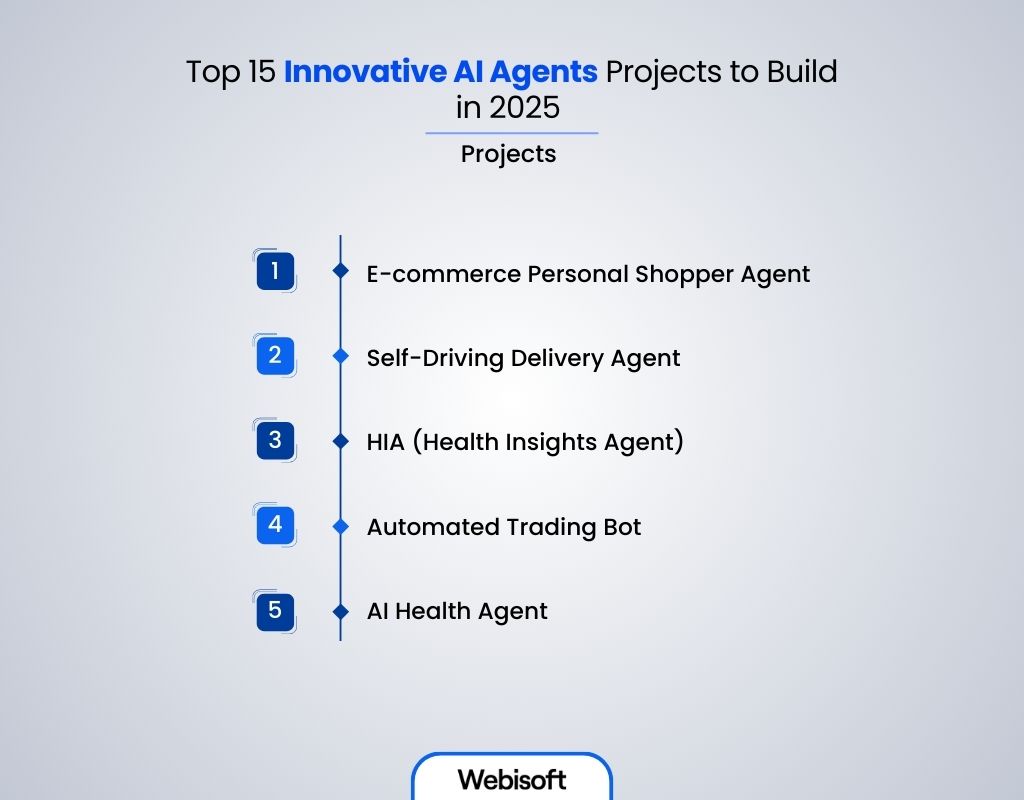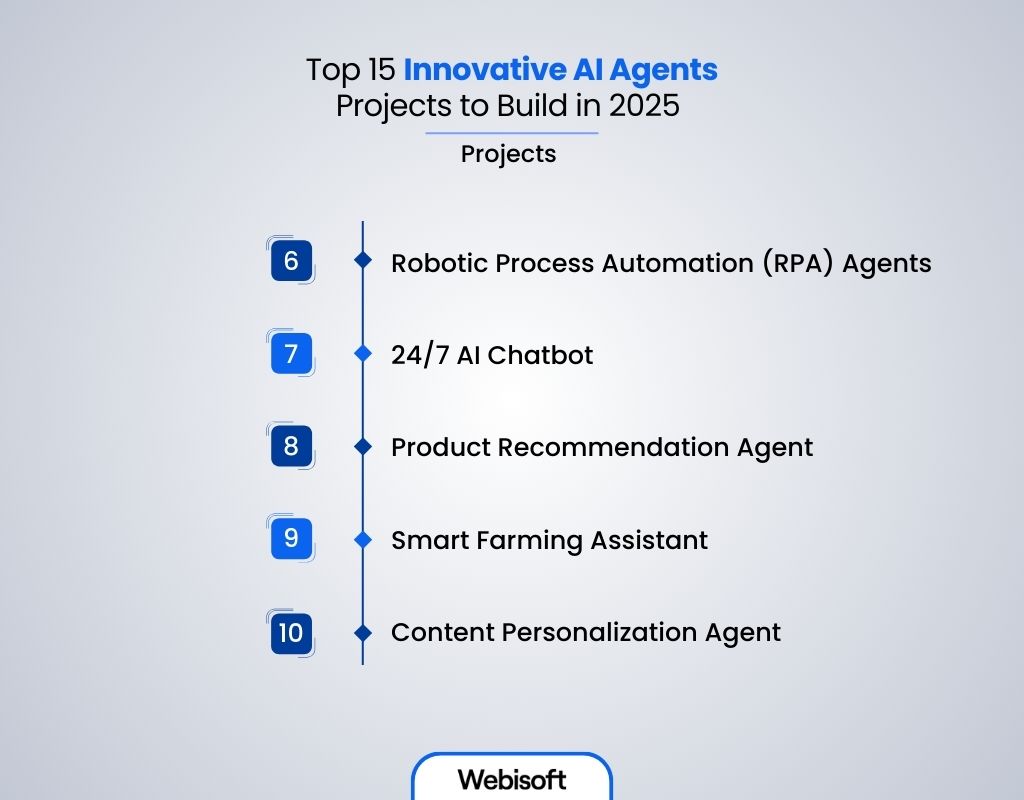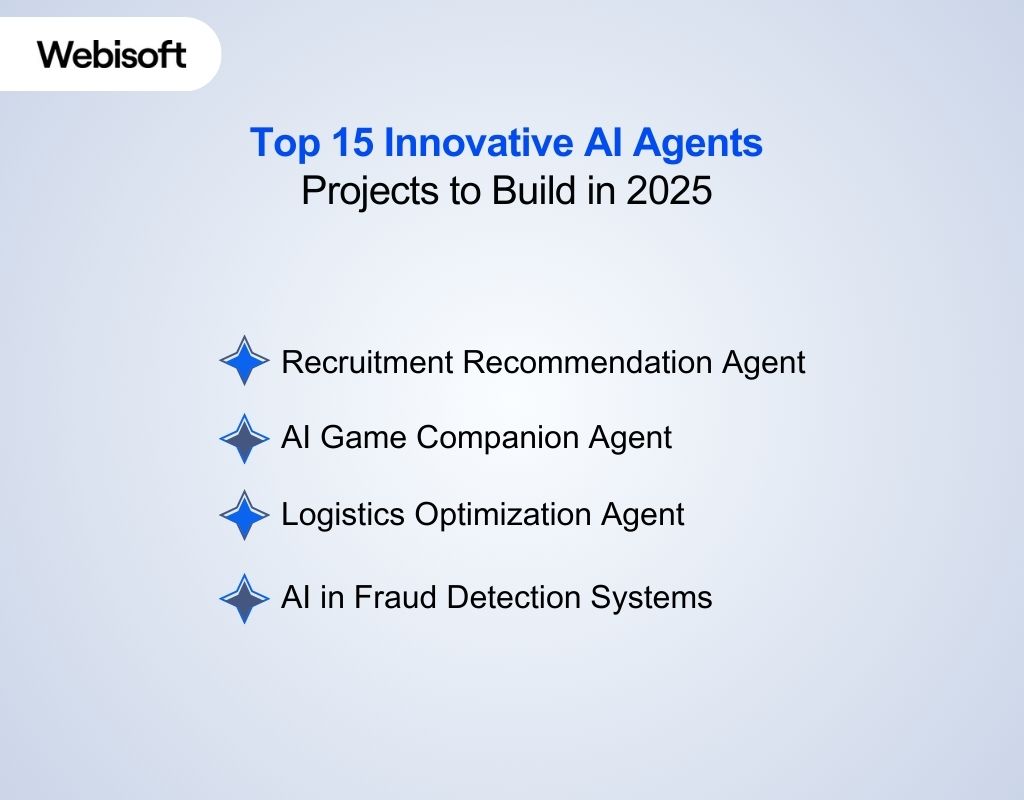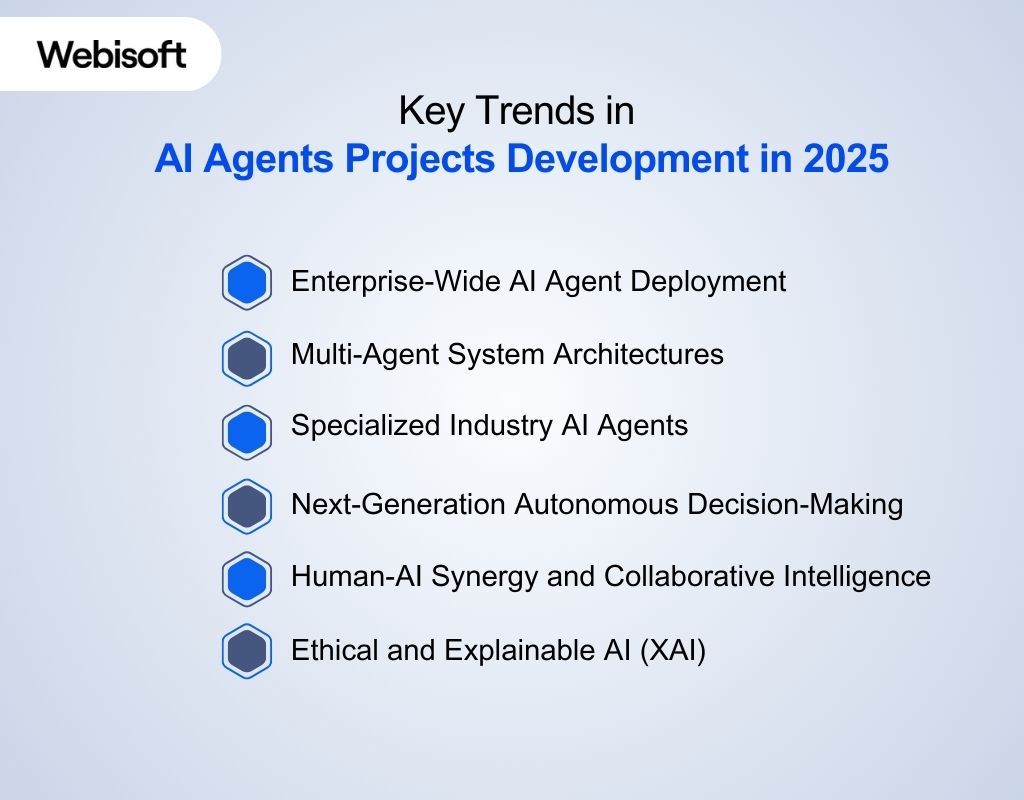Top 15 AI Agents Projects to Watch for in 2025
- BLOG
- Artificial Intelligence
- September 21, 2025
AI agents are just transforming how businesses operate, communicate, and grow. You need efficient AI agent projects ideation that covers everything from planning, prompt engineering, workflow design, coding, tools, API integration, and more.
These precisely deployed task-specific agents handle sales, support, marketing, HR, and even complex decision-making, all without human intervention.
The scope? You’re getting massive opportunities. From startups to enterprises, companies are using AI agents to reduce labor costs, boost productivity, and deliver 24/7 service. Key features like reasoning, natural language understanding, and API integration make these agents powerful assets for automation.
If you’re planning your next digital leap, our top-listed AI agent projects details should be your go-to blueprint. Utilize it to build your next smart and scalable agents for your business goals.
Contents
- 1 What Are AI Agents?
- 2 Quick Overview: Best 15 AI Agents Projects to Build in 2025
- 3 Top 15 Innovative AI Agents Projects to Build in 2025
- 3.1 1. E-commerce Personal Shopper Agent
- 3.2 2. Self-Driving Delivery Agent
- 3.3 3. HIA (Health Insights Agent)
- 3.4 4. Automated Trading Bot
- 3.5 5. AI Health Agent
- 3.6 6. Robotic Process Automation (RPA) Agents
- 3.7 7. 24/7 AI Chatbot
- 3.8 8. Product Recommendation Agent
- 3.9 9. Smart Farming Assistant
- 3.10 10. Content Personalization Agent
- 3.11 11. Recruitment Recommendation Agent
- 3.12 12. AI Game Companion Agent
- 3.13 13. Logistics Optimization Agent
- 3.14 14. AI in Fraud Detection Systems
- 4 Key Trends in AI Agents Projects Development in 2025
- 5 Build Your Ideal AI Agents Projects with Webisoft’s Expertise
- 6 In Closing
- 7 Frequently Asked Questions
What Are AI Agents?
An AI agent is a software program that autonomously interacts with its environment to achieve specific goals. It perceives data through sensors or inputs, analyzes that information, and makes decisions without constant human intervention.
AI agent platform can learn from experience, adapt to changing conditions, and communicate with users or other systems.
They are goal-oriented, meaning they plan and act to fulfill predefined or learned objectives.
Key Features of AI Agents:
- Autonomy: Operate independently without constant human input.
- Perception: Sense and interpret their environment via data or sensors.
- Reactivity: Respond dynamically to changes in their surroundings.
- Reasonecision-making: Analyze information and choose optimal actions.
- Learning: Improve performance over time through experience.
- Communication: Interact naturally with humans or other agents.
- Goal-oriented: Focus on achieving specific tasks or objectives.
These capabilities are also highlighted in our Detailed guide to AI agents.
Quick Overview: Best 15 AI Agents Projects to Build in 2025
| AI Agent Project | Use Cases | GitHub Source Link |
| E-commerce Personal Shopper Agent | Personalized shopping, customer retention, improved conversion rates. | GitHub Link |
| Self-Driving Delivery Agent | Last-mile delivery, reducing delivery costs, and enhancing speed. | GitHub Link |
| HIA (Health Insights Agent) | Personalized health advice, early detection of diseases, and improved treatment plans. | GitHub Link |
| Automated Trading Bot | Stock trading, cryptocurrency trading, and improving investment strategies. | GitHub Link |
| AI Health Assistant | Healthcare automation, personalized patient care, and telemedicine support. | GitHub Link |
| Robotic Process Automation (RPA) Agents | Improving business efficiency, reducing human errors, and cost-cutting. | GitHub Link |
| 24/7 AI Chatbot | Customer support, lead generation, service automation. | GitHub Link |
| Product Recommendation Agent | E-commerce personalization enhances sales, customer satisfaction. | GitHub Link |
| Smart Farming Assistant | Increased agricultural productivity, sustainable farming practices, and resource management. | GitHub Link |
| Content Personalization Agent | Personalized news feeds, video streaming platforms, and digital marketing. | GitHub Link |
| Recruitment Recommendation Agent | Faster hiring processes, improving job match quality, and reducing recruitment bias. | GitHub Link |
| AI Game Companion Agent | Enhancing player experience, game difficulty balancing, and virtual companions. | GitHub Link |
| Logistics Optimization Agent | Cost reduction, improving delivery times, and efficient resource management. | GitHub Link |
| AI in Fraud Detection Systems | Payment fraud prevention, identity theft detection, and reducing financial losses. | GitHub Link |
Top 15 Innovative AI Agents Projects to Build in 2025
Get the list of autonomous AI agents projects to explore and build in 2025.
These projects showcase the latest advancements in AI technology and offer hands-on opportunities to develop intelligent systems:

1. E-commerce Personal Shopper Agent
- Industry: E-commerce, Retail
The e-commerce agent uses AI to recommend products based on your browsing behavior and previous purchases. The system customizes the shopping experience, boosting customer satisfaction and increasing sales.
It updates recommendations in real time as customers interact with the platform, adjusting suggestions based on ongoing behavior and personalized AI experiences.
As the system gathers more data, it improves the accuracy of product recommendations. It creates an engaging shopping experience that drives conversion rates and customer loyalty.
Project Overview:
To build an E-commerce Personal Shopper Agent, start by structuring customer data using Pydantic for accuracy.
OpenAI GPT-4 processes customer queries and provides tailored product recommendations. Use TensorFlow or PyTorch to analyze browsing and purchase behavior to predict future purchases.
Apache Kafka streams real-time data, updating recommendations as customers interact with the site. Deploy the system with FastAPI, integrate Stripe API for payment data, and host on AWS or Google Cloud for scalability.
Example in Industry:
Amazon Alexa Shopping Assistant: Amazon’s Alexa acts as a personal shopping assistant that suggests products based on voice commands and past shopping activity.
2. Self-Driving Delivery Agent
- Industry: Logistics, Transportation
The Self-Driving Delivery Agent automates the delivery process using autonomous vehicles or drones. These systems utilize advanced AI, including computer vision and deep learning, to navigate urban environments safely.
By removing the need for human drivers, it reduces operational costs and enhances efficiency in last-mile delivery.
Project Overview:
The Self-Driving Delivery Agent uses Reinforcement Learning (RL) to continuously improve its decision-making. As it interacts with its environment, such as road conditions and traffic, it learns by trial and error.
For example, the agent observes its surroundings, makes decisions like braking or turning, and receives rewards or penalties based on its actions.
Techniques like Deep Q-Learning or PPO help refine these strategies. Through Sensor Fusion, the agent combines data from various sensors.
It gives it a clearer view of the environment. SLAM ensures it maps and tracks its position accurately
Example in Industry:
Waymo’s Autonomous Delivery Service: Waymo, a subsidiary of Alphabet, uses autonomous vehicles to provide commercial delivery services, improving efficiency and reducing costs in logistics.
3. HIA (Health Insights Agent)
- Industry: Healthcare, Medical Technology
A Health Insights Agent (HIA) uses AI to analyze patient data and provide personalized health recommendations.
It processes medical records, lifestyle data, and historical health information to predict potential risks and detect early signs of disease. By applying predictive analytics, the HIA offers insights that guide healthcare providers in delivering personalized care plans.
This approach improves decision-making, enhances patient outcomes, and helps optimize healthcare resources, all while reducing costs and ensuring timely interventions.
Project Overview:
To build an HIA, gather medical data from various sources such as electronic health records (EHR) and wearables. Use machine learning models to predict health trends and detect anomalies.
Natural Language Processing processes patient queries and provides personalized advice. Data validation is handled by Pydantic, and the system is deployed using FastAPI for seamless integration with healthcare systems.
Cloud services like AWS or Google Cloud are used to manage the vast data and provide scalable processing power.
Example in Industry:
Babylon Health: Babylon Health uses AI-powered health assessments and provides virtual consultations with doctors, offering real-time medical insights.
4. Automated Trading Bot
- Industry: Finance, Stock Market, Cryptocurrency
An automated trading bot uses AI to analyze financial data and execute trades based on pre-set strategies. It collects market data, including stock prices, historical trends, and news, to make real-time decisions.
Using algorithms and machine learning techniques like Reinforcement Learning (RL), the bot learns from market fluctuations, optimizing buy, sell, and hold decisions.
This approach improves trading efficiency, reduces human error, and operates 24/7 for both individual traders and institutions.
Project Overview:
To build your own automated trading bot, start by connecting to exchange APIs to gather real-time and historical market data. Use this data to calculate key indicators like Moving Averages, RSI, and MACD over an n-day window.
It helps your bot decide when to Buy, Sell, or Hold. Automate trade execution securely through the API and add risk management features like stop-loss orders to protect your investments.
Example in Industry:
Robo-advisors by Betterment: Betterment offers automated investment services by using algorithms to manage portfolios based on customer risk preferences and market conditions.
Building an AI trading bot requires a solid foundation and meticulous planning.
Webisoft leads you through each phase with advanced AI services to create bots that perform consistently in live markets.
5. AI Health Agent
- Industry: Healthcare, Telemedicine, Medical Services
An AI agent in the health industry is an intelligent system designed to assist users with health-related queries and management.
By analyzing medical records, symptoms, and lifestyle data, it provides personalized health advice, reminders for medication, and health tracking.
It improves accessibility to healthcare, enhances patient engagement, and promotes healthier habits. Companies can get timely, actionable health insights directly to users. Industries are no longer depend on in-person consultations.
Project Overview:
The AI Health Assistant project uses CrewAI as the core framework for orchestrating autonomous AI agents, enabling complex task management through modular Crews and Flows.
It employs LangChain-Groq for efficient Llama 3 model inference, providing advanced natural language understanding.
Real-time health data, such as blood glucose levels, are retrieved via RapidAPI integrations.
Key agents include a Data Fetcher that obtains patient metrics and an Analysis Agent that evaluates data patterns to generate personalized health recommendations.
Example in Industry:
Ada Health: Ada Health uses AI to assess symptoms and provide users with personalized health advice and recommendations.

6. Robotic Process Automation (RPA) Agents
- Industry: Business Process Automation, Finance, IT
Robotic Process Automation (RPA) Agents automate repetitive tasks and processes, reducing the need for human intervention. These bots perform tasks like data entry, invoice processing, and customer support across various industries.
RPA agents work by following pre-defined rules and workflows, interacting with software applications as humans would. This improves efficiency, reduces errors, and cuts operational costs.
Project Overview:
The Robotic Process Automation (RPA) Agents project uses CrewAI for managing autonomous bots that automate healthcare workflows such as patient data extraction and appointment scheduling.
It integrates securely with hospital systems and APIs to access electronic health records and device data.
The project uses LangChain-Groq for running Llama 3 inference, enabling intelligent decision-making within bots. Modular RPA agents handle tasks like data validation, anomaly detection, and claims processing
Example in Industry:
UiPath: UiPath is a leader in RPA, automating tasks like customer service, data entry, and invoicing. It increases efficiency and reduces operational costs.
7. 24/7 AI Chatbot
- Industry: Customer Service, E-commerce, IT
In industries where customer support is essential, waiting for assistance can be frustrating. That’s where a 24/7 AI Chatbot steps in. This AI agent provides instant, round-the-clock support, handling customer inquiries, troubleshooting, and complex issues without human involvement.
Using Natural Language Processing (NLP), the chatbot understands and responds to your questions in real-time.
Whether you’re looking for answers to FAQs or need help with specific problems, the chatbot ensures quicker responses, greater efficiency
Project Overview:
To build a 24/7 AI Chatbot, use OpenAI GPT-4 for processing and generating natural language responses. Employ Rasa or Dialogflow to train the chatbot on intent recognition and manage various customer queries effectively.
Use FastAPI to deploy the chatbot swiftly and ensure seamless integration with web and mobile platforms.
Host the system on scalable cloud services like AWS or Google Cloud to support large volumes of interactions and ensure high availability
Example in Industry:
Intercom: Intercom provides AI-powered chatbots that automate customer support, enabling businesses to respond to customers instantly and effectively.
8. Product Recommendation Agent
- Industry: E-commerce, Retail, Marketing
A product recommendation agent analyzes customer behavior, such as browsing history and previous purchases, to suggest products they’re likely to buy.
This AI-powered system enhances user experience by offering real-time, relevant recommendations.
It uses machine learning to adapt to customer preferences, ensuring that the suggestions stay accurate and and personalized over time.
Project Overview:
To build a product recommendation agent, first gather customer data, including browsing patterns, search queries, and purchase history.
Collaborative Filtering identifies patterns in customer behavior, while Content-Based Filtering suggests products similar to those the customer has previously shown interest in.
Use TensorFlow or PyTorch to create machine learning models that predict which products the customer will like. Integrate Apache Kafka for real-time data streaming, allowing the agent to update recommendations instantly
Example in Industry:
Amazon’s Product Recommendations: Amazon uses an advanced recommendation engine that suggests products based on your browsing history and previous purchases.
9. Smart Farming Assistant
- Industry: Agriculture, Farming Technology
A smart farming assistant uses AI to optimize agricultural practices, helping farmers increase crop yields while minimizing resource use. By analyzing data from sensors, weather forecasts, and historical crop performance, the assistant can make recommendations for irrigation, fertilization, and pest control.
The system provides real-time insights into soil health, crop growth, and environmental conditions
Project Overview:
The Smart Farming Assistant project integrates real-time data from IoT sensors (soil moisture, pH, temperature) and weather APIs to monitor farm conditions.
It uses AI/ML models, specifically Convolutional Neural Networks (CNNs) like ResNet50, EfficientNet, and MobileNetV2, for tasks such as crop recommendation, plant disease identification from images, and personalized fertilizer recommendations.
The system also includes a recommendation engine for optimal crop suggestions based on soil and climate data
Example in Industry:
John Deere’s Smart Farming Solutions: John Deere uses AI and IoT to optimize farming operations. It offers tools that monitor soil health, crop performance, and environmental conditions.
10. Content Personalization Agent
- Industry: Media, Entertainment, Digital Marketing
A content personalization agent tailors digital content to individual users based on their preferences, behaviors, and interactions.
It analyzes user data, such as browsing history, clicks, and engagement patterns, to recommend articles, videos, or products that match their interests.
This AI-driven system improves user engagement by offering relevant content that aligns with individual tastes, increasing time spent on platforms and boosting conversion rates for businesses.
In the same way, businesses are also enhancing their digital strategies with SEO AI tools. These tools help automate keyword research, content optimization, and competitor analysis to ensure visibility in search results.
Alongside AI-powered platforms, businesses continue to rely on trusted SEO solutions such as Ahrefs, Moz, Similarweb, SEMrush, and Semrush alternative tools, to gain competitive insights, track backlinks, and monitor traffic sources. These platforms remain some of the most powerful options, offering deep analytics and actionable data to improve online visibility.
Project Overview:
The content personalization agent project uses a multi-agent architecture where specialized agents manage tasks like user behavior analysis, content filtering, and recommendation generation.
It uses large language models such as Llama 3 via LangChain-Groq for efficient natural language understanding and decision-making.
The system integrates diverse data sources through secure APIs and applies machine learning techniques like collaborative and content-based filtering.
Example in Industry:
Netflix’s Content Recommendation System: Netflix uses machine learning algorithms to personalize movie and TV show recommendations based on users’ viewing history and preferences.

11. Recruitment Recommendation Agent
- Industry: HR, Recruitment, Talent Acquisition
A Recruitment Recommendation Agent automates the hiring process by matching candidates to job openings based on their skills, experience, and preferences.
It analyzes resumes, job descriptions, and historical hiring data to make the best matches. This AI-driven system streamlines recruitment, reduces bias, and speeds up hiring decisions.
By learning from previous hires and feedback, the agent continuously improves its recommendations. It ensures companies find the most qualified candidates efficiently.
Project Overview:
The recruitment recommendation agent project uses advanced AI technologies for accurate candidate-job matching. It uses GPT-4 via LangChain for resume parsing, automated interviews, and feedback generation.
Graph Neural Networks (GNNs) analyze hidden features in resumes and job listings to improve matching accuracy.
Real-time job data is collected via web scraping and APIs. The system stores structured data in PostgreSQL and uses Pinecone for fast vector-based semantic search
Example in Industry:
LinkedIn’s Job Matching System: LinkedIn’s AI-driven system matches job seekers with relevant roles based on their resumes and profile data, improving hiring efficiency.
To build a reliable recruitment recommendation agent, you need a mix of technical skills and strategic planning.
Webisoft supports you throughout the process, offering advanced technologies and actionable solutions to develop a system.
12. AI Game Companion Agent
- Industry: Gaming, Entertainment
An AI Game Companion Agent enhances your gaming experience by acting as an intelligent in-game assistant. It learns your playstyle and provides personalized advice, guidance, and even in-game help.
The agent can suggest strategies, point out hidden items, or offer tips to improve performance. By adapting to your actions and preferences, it becomes a constant companion, enriching the gameplay
Project Overview:
These AI agents projects uses powerful AI models like Llama 3 to understand and respond to players in real time. It learns from how players behave to give personalized help during the game.
Different AI agents handle tasks like watching the game environment, giving strategy tips, and controlling non-player characters (NPCs).
It connects with game engines like Unreal Engine, so the companion can follow players, interact with objects
Example in Industry:
Twitch’s AI Chatbot for Game Tips: Twitch offers AI-driven chatbots that interact with viewers, providing gaming tips, live statistics, and other relevant content.
13. Logistics Optimization Agent
- Industry: Logistics, Supply Chain Management, Retail
A Logistics Optimization Agent improves supply chain and delivery operations by analyzing routes, inventory, and shipment data. The agent uses AI to optimize routes, predict delivery times, and manage inventory levels in real-time.
It adjusts to traffic, weather conditions, and customer demands, ensuring timely and cost-efficient deliveries. By automating these tasks, it reduces human error, minimizes fuel consumption,
Project Overview:
The logistics optimization agent uses AI to enhance supply chain efficiency by integrating real-time data from IoT sensors, GPS, and inventory systems. It applies advanced machine learning algorithms to optimize routes, manage inventory, and predict demand.
Built with tools like LangChain-Groq for Llama 3 inference and platforms such as CrewAI or Inya.ai, the agent automates workflows and allows for human approval when needed
Example in Industry:
UPS’s ORION (On-Road Integrated Optimization and Navigation): UPS uses AI to optimize delivery routes, reducing fuel consumption and improving delivery efficiency for its global fleet.
14. AI in Fraud Detection Systems
- Industry: Finance, Banking, Security
Fraud detection is a critical challenge for many industries, and AI plays a significant role in identifying suspicious activities. AI in Fraud Detection Systems analyzes transaction data, user behaviors, and patterns to detect anomalies and prevent fraudulent activities in real-time.
Machine learning models are trained to recognize both known fraud patterns and emerging threats.
Project Overview:
The project use real-time data ingestion tools like Apache Kafka to collect transaction and user behavior data. It cleans and highlights suspicious patterns, then applies smart machine learning models, such as Random Forests and neural networks to spot fraud quickly.
By using techniques like Graph Neural Networks and Natural Language Processing, it understands complex connections and unstructured information.
Plus, it runs on scalable cloud platforms to meet compliance standards like GDPR and PCI DSS.
Example in Industry:
PayPal’s Fraud Detection System: PayPal uses AI to analyze transaction patterns and detect fraudulent activities in real-time, ensuring secure financial transactions.
Key Trends in AI Agents Projects Development in 2025

As AI agents become central to business and technology in 2025, several key trends are shaping their development and adoption.
1. Enterprise-Wide AI Agent Deployment
Organizations are moving beyond pilots to deploy AI agents across entire business functions. These agents automate workflows at scale, boosting productivity by up to 35% and reducing operational costs by 20-30%.
Examples include Salesforce Agentforce 2.0 and Microsoft Copilot agents that integrate deeply with enterprise systems.
2. Multi-Agent System Architectures
AI agents increasingly work in collaborative networks where specialized agents communicate and coordinate.
This approach improves problem-solving speed and accuracy, with applications in supply chain, finance, and content creation.
3. Specialized Industry AI Agents
AI agents projects are becoming domain experts, such as AI lawyers or radiologists. These specialized agents augment human expertise by handling complex, data-heavy tasks, transforming industries like healthcare, law, and advertising.
4. Next-Generation Autonomous Decision-Making
Advances in reinforcement learning and neuro-symbolic AI enable agents to make complex, real-time decisions without human input.
They handle unpredictable scenarios with improved speed and accuracy, balancing multiple objectives.
5. Human-AI Synergy and Collaborative Intelligence
Rather than replacing humans, AI agents increasingly collaborate with them. This synergy enhances creativity, judgment, and ethical decision-making by combining human intuition with AI’s data processing.
6. Ethical and Explainable AI (XAI)
Transparency and accountability are critical as AI agents take on more responsibility. Explainable AI ensures agents can clarify their reasoning, which is vital in sensitive fields like healthcare and criminal justice
Build Your Ideal AI Agents Projects with Webisoft’s Expertise
Now that you understand AI agents projects, what they are, the different types, and how they benefit businesses, it’s time to take the next step. If you’re ready to build an AI agent for your specific needs, you’ll need an experienced partner to ensure the project’s success.
Webisoft offers a comprehensive range of AI services to help you at every stage of development. Here’s how we can assist:
- Expert AI Consulting: We identify high-impact AI opportunities tailored to your business goals and technical needs.
- Custom AI Model Development: We create models designed to address your specific challenges, improving efficiency and driving results.
- Seamless Integration: Our team ensures smooth integration of AI agents into your existing systems, including data pipelines and workflows.
- Advanced AI Capabilities: We equip agents with cutting-edge features like predictive analytics, document search, and multimodal processing (text, voice, and images).
- LLM & RAG Solutions: We offer advanced language models and retrieval-augmented chatbots for accurate, real-time responses.
- Ongoing Monitoring & Optimization: Our services include continuous monitoring, updates, and fine-tuning to ensure long-term effectiveness as your business evolves.
- Robust Security & Compliance: We prioritize security, ensuring your AI solutions meet key standards like GDPR, HIPAA, and other industry regulations.
In Closing
AI agents projects are opening powerful new doors for businesses ready to innovate. These intelligent systems are not limited to automating tasks. They think, learn, and evolve with your operations. From boosting productivity to cutting costs and offering 24/7 service, the impact is real and measurable.
Whether you’re starting small or scaling fast, AI agents give you a smart edge in today’s fast-moving market. Now’s the time to move beyond traditional tools. Need expert guidance?
Connect with Webisoft today to kickstart your AI agent project with confidence.
Frequently Asked Questions
1. What factors should be considered before starting an AI agent project?
You should assess your business objectives, data availability, use-case complexity, integration requirements, and compliance needs. A clear scope ensures the agent is purpose-built and ROI-focused.
2. What industries are most likely to adopt AI agents in the near future?
Industries such as healthcare, finance, retail, and logistics are expected to adopt AI agents more rapidly. These sectors can benefit from improved decision-making, enhanced customer service, and streamlined operations.
3. What are the risks or limitations associated with AI agent deployment?
Risks include data privacy concerns, model hallucination, over-reliance on automation, and integration challenges. Proper testing, monitoring, and human-in-the-loop strategies help mitigate these.
4. Can AI agents be customized for industry-specific workflows?
Absolutely. AI agents can be tailored using domain-specific data, business logic, and tool integrations, whether for finance, healthcare, e-commerce, or legal services.
